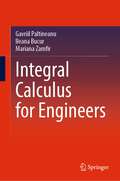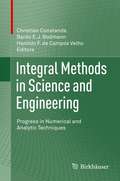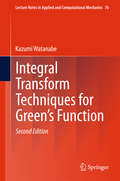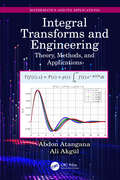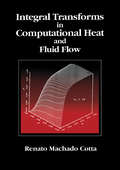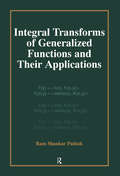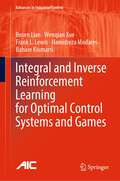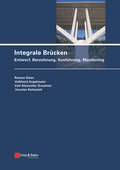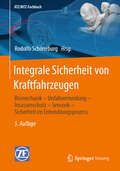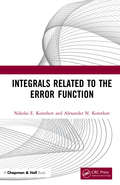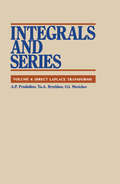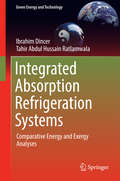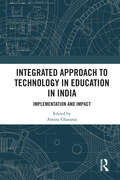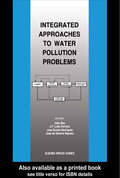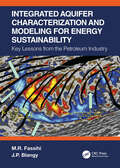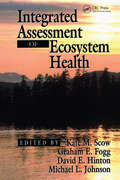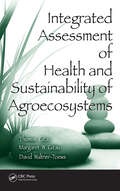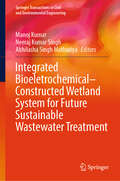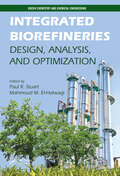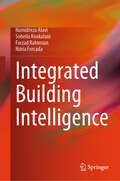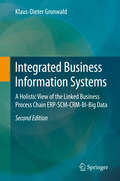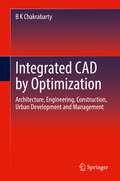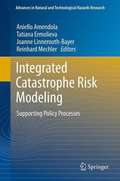- Table View
- List View
Integral Calculus for Engineers
by Ileana Bucur Gavriil Paltineanu Mariana ZamfirThe book mainly deals with basic concepts and examples about integral calculus such as indefinite integral, definite integral, improper integrals, integrals dependent on parameters, lines integrals, double and triple integrals, and surface integrals. These basic elements of integral calculus are well presented in this book, and they are indispensable for students in higher technical education to successfully approach other theoretical or technical disciplines.
Integral Methods in Science and Engineering: Progress in Numerical and Analytic Techniques
by Christian Constanda Bardo E.J. Bodmann Haroldo F. VelhoAdvances in science and technology are driven by the development of rigorous mathematical foundations for the study of both theoretical and experimental models. With certain methodological variations, this type of study always comes down to the application of analytic or computational integration procedures, making such tools indispensible. With a wealth of cutting-edge research in the field, Integral Methods in Science and Engineering: Progress in Numerical and Analytic Techniques provides a detailed portrait of both the construction of theoretical integral techniques and their application to specific problems in science and engineering. The chapters in this volume are based on talks given by well-known researchers at the Twelfth International Conference on Integral Methods in Science and Engineering, July 23-27, 2012, in Porto Alegre, Brazil. They address a broad range of topics, from problems of existence and uniqueness for singular integral equations on domain boundaries to numerical integration via finite and boundary elements, conservation laws, hybrid methods, and other quadrature-related approaches. The contributing authors bring their expertise to bear on a number of topical problems that have to date resisted solution, thereby offering help and guidance to fellow professionals worldwide. Integral Methods in Science and Engineering: Progress in Numerical and Analytic Techniques will be a valuable resource for researchers in applied mathematics, physics, and mechanical and electrical engineering, for graduate students in these disciplines, and for various other professionals who use integration as an essential tool in their work.
Integral Transform Techniques for Green's Function
by Kazumi WatanabeIn this book mathematical techniques for integral transforms are described in detail but concisely. The techniques are applied to the standard partial differential equations, such as the Laplace equation, the wave equation and elasticity equations. The Green's functions for beams, plates and acoustic media are also shown along with their mathematical derivations. Lists of Green's functions are presented for the future use. The Cagniard's-de Hoop method for the double inversion is described in detail, and 2D and 3D elasto-dynamics problems are fully treated.
Integral Transforms and Engineering: Theory, Methods, and Applications (Mathematics and its Applications)
by Abdon Atangana Ali AkgülWith the aim to better understand nature, mathematical tools are being used nowadays in many different fields. The concept of integral transforms, in particular, has been found to be a useful mathematical tool for solving a variety of problems not only in mathematics, but also in various other branches of science, engineering, and technology. Integral Transforms and Engineering: Theory, Methods, and Applications presents a mathematical analysis of integral transforms and their applications. The book illustrates the possibility of obtaining transfer functions using different integral transforms, especially when mapping any function into the frequency domain. Various differential operators, models, and applications are included such as classical derivative, Caputo derivative, Caputo-Fabrizio derivative, and Atangana-Baleanu derivative. This book is a useful reference for practitioners, engineers, researchers, and graduate students in mathematics, applied sciences, engineering, and technology fields.
Integral Transforms in Computational Heat and Fluid Flow
by Renato Machado CottaIntegral Transforms in Computational Heat and Fluid Flow is a comprehensive volume that emphasizes the generalized integral transform technique (G.I.T.T.) and the developments that have made the technique a powerful computational tool of practical interest. The book progressively demonstrates the approach through increasingly difficult extensions and test problems. It begins with an overview of the generalized integral transform technique in contrast with classical analytical ideas.Various applications are presented throughout the book, including transient fin analysis with time-dependent surface dissipation, laminar forced convection inside externally finned tubes, metals oxidation at high temperatures, forced convection in liquid metals, and Navier-Stokes equations.
Integral Transforms of Generalized Functions and Their Applications
by Ram Shankar PathakFor those who have a background in advanced calculus, elementary topology and functional analysis - from applied mathematicians and engineers to physicists - researchers and graduate students alike - this work provides a comprehensive analysis of the many important integral transforms and renders particular attention to all of the technical aspects of the subject. The author presents the last two decades of research and includes important results from other works.
Integral and Inverse Reinforcement Learning for Optimal Control Systems and Games (Advances in Industrial Control)
by Frank L. Lewis Bosen Lian Wenqian Xue Hamidreza Modares Bahare KiumarsiIntegral and Inverse Reinforcement Learning for Optimal Control Systems and Games develops its specific learning techniques, motivated by application to autonomous driving and microgrid systems, with breadth and depth: integral reinforcement learning (RL) achieves model-free control without system estimation compared with system identification methods and their inevitable estimation errors; novel inverse RL methods fill a gap that will help them to attract readers interested in finding data-driven model-free solutions for inverse optimization and optimal control, imitation learning and autonomous driving among other areas. Graduate students will find that this book offers a thorough introduction to integral and inverse RL for feedback control related to optimal regulation and tracking, disturbance rejection, and multiplayer and multiagent systems. For researchers, it provides a combination of theoretical analysis, rigorous algorithms, and a wide-ranging selection of examples. The book equips practitioners working in various domains – aircraft, robotics, power systems, and communication networks among them – with theoretical insights valuable in tackling the real-world challenges they face.
Integrale Brücken: Entwurf, Berechnung, Ausführung, Monitoring
by Roman Geier Volkhard Angelmaier Carl-Alexander Graubner Jaroslav KohoutekIntegrale Brücken erfordern weniger Aufwand in Wartung und Instandhaltung als konventionelle Brücken. Daher wird diese Bauweise sowohl im Neubaubereich als auch bei der Umrüstung bestehender Bauwerke immer populärer. Insbesondere die Planung, aber auch die Ausführung integraler Brücken, erfordert in einigen Bereichen besondere Aufmerksamkeit und Kenntnisse. Zwangsschnittgrößen sowie die Auswirkungen der Bauwerk-Baugrund-Interaktion müssen in der Bemessung und der konstruktiven Durchbildung entsprechend beachtet werden. Allerdings ermöglicht die Bauweise auch eine besondere Gestaltung, die dem integralen Tragverhalten Rechnung trägt und dieses in geeigneter Weise auch ästhetisch umsetzen kann. Das Handbuch stellt das dafür notwendige Ingenieur-Know-how umfassend bereit und ist damit eine wertvolle Arbeitshilfe für Entwurf, Ausführung und Überwachung integraler Brücken.
Integrale Sicherheit von Kraftfahrzeugen: Biomechanik – Unfallvermeidung – Insassenschutz – Sensorik – Sicherheit im Entwicklungsprozess (ATZ/MTZ-Fachbuch)
by Rodolfo SchöneburgDie integrale Sicherheit nimmt bei der Auslegung von Kraftfahrzeugen, bei Umfrageergebnissen von Fahrzeugnutzern und bei der Berichterstattung in Fachzeitschriften bzw. im Internet einen hohen Stellenwert ein. Dabei ändern sich die Entwicklungs-Randbedingungen durch neue Gesetze, Rating-Programme und CAE-Methoden in immer kürzeren Abständen. Ein Innovationsschwerpunkt liegt auf dem Gebiet der zunehmenden Automatisierung von Fahraufgaben und der Phase, die die aktive mit der passiven Sicherheit verbindet - der präventiven Sicherheit.Dieses Buch dient seit 25 Jahren als wichtige Referenz für alle, die in der Fahrzeugsicherheit tätig sind. In der 5. Auflage wurde der wachsenden Bedeutung von Unfallvermeidung und -minderung durch die Aufnahme eines eigenen Kapitels und neuer Abschnitte zur Telematik und Radartechnologie bei der Sensorik Rechnung getragen. Die Kapitel zur Bewertung der Fahrzeugsicherheit und zum Insassen- und Partnerschutz wurden umfangreich überarbeitet und aktualisiert. Zudem sind die Umfänge der rechnerischen und experimentellen Simulation in das Kapitel „Integrale Sicherheit im Fahrzeugentwicklungsprozess“ integriert und um neue Methoden ergänzt worden.
Integrals Related to the Error Function
by Nikolai E. Korotkov Alexander N. KorotkovIntegrals Related to the Error Function presents a table of integrals related to the error function, including indefinite and improper definite integrals. Most of the formulas in this book have not been presented in other tables of integrals or have been presented only for some special cases of parameters or for integration only along the real axis of the complex plane. Many of the integrals presented here cannot be obtained using a computer (except via an approximate numerical integration). Additionally, for improper integrals, this book emphasizes the necessary and sufficient conditions for the validity of the presented formulas, including trajectory for going to infinity on the complex plane; such conditions are usually not given in computer-assisted analytical integration and often not presented in the previously published tables of integrals. Features The first book in English language to present a comprehensive collection of integrals related to the error function Useful for researchers whose work involves the error function (e.g., via probability integrals in communication theory). Additionally, it can also be used by broader audience.
Integrals and Series: Direct Laplace Transforms
by A.B PrudnikovVolumes 4 and 5 of the extensive series Integrals and Series are devoted to tables of LaplaceTransforms. In these companion volumes the authors have collected data scatteredthroughout the literature, and have augmented this material with many unpublished resultsobtained in their own research.Volume 4 contains tables of direct Laplace transforms, a number of which are expressed interms of the Meijer G-function. When combined with the table of special cases, theseformulas can be used to obtain Laplace transforms of numerous elementary and specialfunctions of mathematical physics.Volume 5 offers tables of inversion formulas for the Laplace transformation and includestables of factorization and inversion of various integral transforms.
Integrated Absorption Refrigeration Systems
by Ibrahim Dincer Tahir Abdul Hussain RatlamwalaThis book provides a detailed analysis of absorption refrigeration systems, covering single effect to multi-effect systems and their applications. Both the first and second laws of thermodynamics are discussed in relation to refrigeration systems to show how system performance differs from one law to another. Comparative energy and exergy analyses and assessments of single effect, double effect, triple effect and quadruple effect absorption refrigeration system are performed to illustrate the impact of an increase in the number of effects on system performance. In particular, the second law (exergy) formulation for absorption refrigeration systems, rarely discussed by other works, is covered in detail. Integrated Absorption Refrigeration Systems will help researchers, students and instructors in the formulation of energy and exergy efficiency equations for absorption refrigeration systems.
Integrated Air Quality Management: Asian Case Studies
by Nguyen Thi Kim OanhThe steady growth in the number of vehicles on the road, heavy reliance on coal, use of dirty fuels for residential combustion, and extensive open burning are some of the major factors leading to the progressive deterioration of air quality in developing countries in Asia. And despite efforts to establish and implement air quality measurement syste
Integrated Approach to Technology in Education in India: Implementation and Impact
by Amina CharaniaThis book explores the evolution of Integrated approach to Technology in Education (ITE), an initiative of Tata Trusts in India, and the many innovative ways in which it has helped enrich the learning process and fostered new skills for young people, especially those living in challenging environments. The book offers an in-depth look into authentic, creative and project-based learning experiences that have been facilitated by using technology in education in different settings in India, with case studies about opportunities and challenges of implementing ITE in the tribal pockets of West Bengal and Maharashtra, madrasas in West Bengal, government schools in rural Assam and sites in Uttar Pradesh. It examines the viability and sustainability of using ITE and other digital methods to address the complex education needs of children and address the challenges in the professional development of teachers. It also highlights the creative use of inquiry, project-based collaborative learning and distance education technologies during the pandemic in government-run schools. This book will be of interest to teachers, students and researchers of education, education technology, ICT and education, digital education and information technology. It will also be useful for educators, policymakers, educational institutions, EdTech start-ups and NGOs in the education sector.
Integrated Approaches to Water Pollution Problems
by João Bau J.P.Lobo Ferreira José Duarte Henriques José de Oliveira RaposoPapers presented at the International Symposium of Integrated Approaches to Water Pollution Problems [SISIPPA 89], Laboratorio Nacional de Engenharia Civil, Lisbon, Portugal, June 1989.
Integrated Aquifer Characterization and Modeling for Energy Sustainability: Key Lessons from the Petroleum Industry
by M.R. Fassihi J.P. BlangyThe greatest challenge facing humanity today is the transition to a more sustainable energy infrastructure while reducing greenhouse gas emissions. Meeting this challenge will require a diversified array of solutions spanning across multiple industries. One of the solutions rising to the fore is the potential to rapidly build out carbon sequestration, which involves the removal of CO2 from the atmosphere and its storage in the subsurface. Integrated Aquifer Characterization and Modeling for Energy Sustainability: Key Lessons from the Petroleum Industry provides a comprehensive and practical technical guide into the potential that aquifers hold as sites for carbon and energy storage. Aquifers occupy a significant part of the Earth’s available volume in the subsurface and thus hold immense potential as sites for carbon storage. Many aquifers have been studied extensively as part of oil and gas energy development projects and, as such, they represent an opportunity to sequester carbon within existing areas of infrastructure that have already been impacted by, and integrated into, an inherited energy framework. Moreover, future efforts to reconfigure the landscape of our national and global energy systems can extract valuable lessons from this existing trove of data and expertise. From a multidisciplinary perspective, this book provides a valuable and up-to-date overview of how we can draw on the wealth of existing technologies and data deployed by the petroleum industry in the transition to a more sustainable future. Integrated Aquifer Characterization and Modeling for Energy Sustainability will be of value to academic, professional and business audiences who wish to evaluate the potential underground storage of carbon and/or energy, and for policy makers in developing the right policy tools to further the goals of a sustainable energy transition.
Integrated Assessment of Ecosystem Health
by K ate M. Scow Graham E. Fogg David E. H Inton Michael L. JohnsonThe new approach to ecosystem health is proactive. As a result, the scope of environmental studies is growing and the methods are evolving. Integrated Assessment of Ecosystem Health aggressively broadens the range of ecotoxicology to include its related fields.The book begins with John Cairns, Jr.'s predictions and recommendations for the futur
Integrated Assessment of Health and Sustainability of Agroecosystems (Advances in Agroecology)
by David Waltner-Toews Thomas Gitau Margaret W. GitauExploring the implementation of participatory, multistakeholder, and transdisciplinary ecosystem health research, Integrated Assessment of Health and Sustainability of Agroecosystems combines the latest theories in complexity and management with practical tools and approaches for sustainable rural development research.Although the text foc
Integrated Bioeletrochemical–Constructed Wetland System for Future Sustainable Wastewater Treatment (Springer Transactions in Civil and Environmental Engineering)
by Manoj Kumar Neeraj Kumar Singh Abhilasha Singh MathuriyaThis book provides latest information and knowledge from internationally recognized experts working in wastewater treatment field. It covers broad aspects of integrated bioeletrochemical-constructed wetland system for future sustainable wastewater treatment and resource recovery. It discusses various constructed wetland and their application in wastewater treatment and the principle and mechanism of bioelectrochemical system for wastewater treatment. The book also reviews the various types of constructed wetland integrated with bioeletrochemical and microbial fuel cells. It includes chapters on the recovery of bioelectricity and bioenergy from wastewater resource using constructed wetland by adoption of microbial fuel cell technology, recent advancements in bioelectrochemical system and microbial fuel cell technology for energy production in constructed wetland, applied bioaugmentation and bioremediation treatment technology in constructed wetland for wastewater treatment, successful models of constructed wetlands applied for water purification across the globe, and chapters on scaling up, economic sustainability, and feasibility and life cycle assessment of constructed wetland for wastewater treatment integrated with microbial fuel cells and bioelectrochemical systems. The book can be a valuable reference for researchers and professionals interested in wastewater treatment and allied fields.
Integrated Biorefineries: Design, Analysis, and Optimization (Green Chemistry and Chemical Engineering)
by Mahmoud M. El-Halwagi Paul R. StuartIntegrated Biorefineries: Design, Analysis, and Optimization examines how to create a competitive edge in biorefinery innovation through integration into existing processes and infrastructure. Leading experts from around the world working in design, synthesis, and optimization of integrated biorefineries present the various aspects of this complex
Integrated Building Intelligence
by Hamidreza Alavi Soheila Kookalani Farzad Rahimian Núria ForcadaThis book integrates of Building Information Modeling (BIM) and Decision Support Systems (DSS) in the field of building design, construction, and maintenance. The book explores how BIM and DSS technologies can be synergistically utilized to enhance performance, comfort, and maintenance efficiency in buildings. With an emphasis on practical applications, the book provides a comprehensive overview of the latest advancements in BIM and DSS, including real-world case studies and implementation guidelines. The book features illustrations, tables, and examples that aid in understanding complex concepts and demonstrate the practical application of BIM and DSS in building projects. Readers will gain a deep understanding of how BIM and DSS can be integrated to optimize building design, streamline construction processes, and improve facility management and maintenance. The main benefit of reading this book is that it provides a valuable resource for professionals in the architecture, engineering, and construction industries who want to leverage the power of BIM and DSS to enhance their building projects. Additionally, the book explores how BIM and DSS can contribute to energy efficiency.
Integrated Business Information Systems: A Holistic View of the Linked Business Process Chain ERP-SCM-CRM-BI-Big Data
by Klaus-Dieter GronwaldEnterprise Resource Planning (ERP), Supply Chain Management (SCM), Customer Relationship Management (CRM), Business Intelligence (BI) and Big Data analytics (BDA) are business related tasks and processes, which are supported by standardized software solutions. The book explains that this requires business-oriented thinking and acting from IT specialists and data scientists. It is a good idea to let students experience this directly from the business perspective, for example as executives of a virtual company in a role-playing game. The second edition of the book has been completely revised, restructured and supplemented with actual topics such as blockchains in supply chains and the correlation between Big Data analytics, artificial intelligence and machine learning. The structure of the book is based on the gradual implementation and integration of the respective information systems from the business and management perspectives. Part I contains chapters with detailed descriptions of the topics supplemented by online tests and exercises. Part II introduces role play and the online gaming and simulation environment. Supplementary teaching material, presentations, templates, and video clips are available online in the gaming area. The gaming and business simulation Kdibisglobal.com, newly created for this book, now includes a beer division, a bottled water division, a soft drink division and a manufacturing division for barcode cash register scanner with their specific business processes and supply chains.
Integrated CAD by Optimization: Architecture, Engineering, Construction, Urban Development and Management
by B K ChakrabartyThis book presents range of topics concerning integrated CAD (including Optimization) for use in Architecture (including Planning), Civil Engineering and Construction (AEC), and thus, helps introduce a full-length treatment of the subject, enabling practitioners to adopt an Integrated Computer-Aided Design Approach in their professional activity. The book gives to readers an understanding of the main elements of CAD, highlighting the importance of integrating these elements and the applicability of Integrated CAD in AEC. Many examples and problems (including Optimization) are included to help professionals and students to develop and apply such tools in solving problems in AEC field. Adopts a problem solving approach in planning, design, and management stressing IT and Computer Application in AEC sector as a whole;Emphasizes resource-efficiency and social equity in problem solution in the AEC sector in general, and in urban development and management in particular;Stresses optimization and an integrated approach covering all components, including costs, affordability and environmental factors, scarcity of resources, and resolution of conflicting interests;Includes an accessible overview and source codes of C++ and Auto Lisp programs needed to carry out design analysis, optimization and drafting-drawing in an integrated manner.
Integrated Catastrophe Risk Modeling: Supporting Policy Processes
by Tatiana Ermolieva Aniello Amendola Reinhard Mechler Joanne Linnerooth-BayerEfficient and equitable policies for managing disaster risks and adapting to global environmental change are critically dependent on development of robust options supported by integrated modeling. The book is based on research and state-of-the art models developed at IIASA (International Institute for Applied Systems Analysis) and within its cooperation network. It addresses the methodological complexities of assessing disaster risks, which call for stochastic simulation, optimization methods and economic modeling. Furthermore, it describes policy frameworks for integrated disaster risk management, including stakeholder participation facilitated by user-interactive decision-support tools. Applications and results are presented for a number of case studies at different problem scales and in different socio-economic contexts, and their implications for loss sharing policies and economic development are discussed. Among others, the book presents studies for insurance policies for earthquakes in the Tuscany region in Italy and flood risk in the Tisza river basin in Hungary. Further, it investigates the economic impact of natural disasters on development and possible financial coping strategies; and applications are shown for selected South Asian countries. The book is addressed both to researchers and to organizations involved with catastrophe risk management and risk mitigation policies.
Integrated Catastrophe Risk Modeling: Supporting Policy Processes (Advances in Natural and Technological Hazards Research #32)
by Tatiana Ermolieva Aniello Amendola Reinhard Mechler Joanne Linnerooth-BayerEfficient and equitable policies for managing disaster risks and adapting to global environmental change are critically dependent on development of robust options supported by integrated modeling. The book is based on research and state-of-the art models developed at IIASA (International Institute for Applied Systems Analysis) and within its cooperation network. It addresses the methodological complexities of assessing disaster risks, which call for stochastic simulation, optimization methods and economic modeling. Furthermore, it describes policy frameworks for integrated disaster risk management, including stakeholder participation facilitated by user-interactive decision-support tools. Applications and results are presented for a number of case studies at different problem scales and in different socio-economic contexts, and their implications for loss sharing policies and economic development are discussed. Among others, the book presents studies for insurance policies for earthquakes in the Tuscany region in Italy and flood risk in the Tisza river basin in Hungary. Further, it investigates the economic impact of natural disasters on development and possible financial coping strategies; and applications are shown for selected South Asian countries. The book is addressed both to researchers and to organizations involved with catastrophe risk management and risk mitigation policies.
